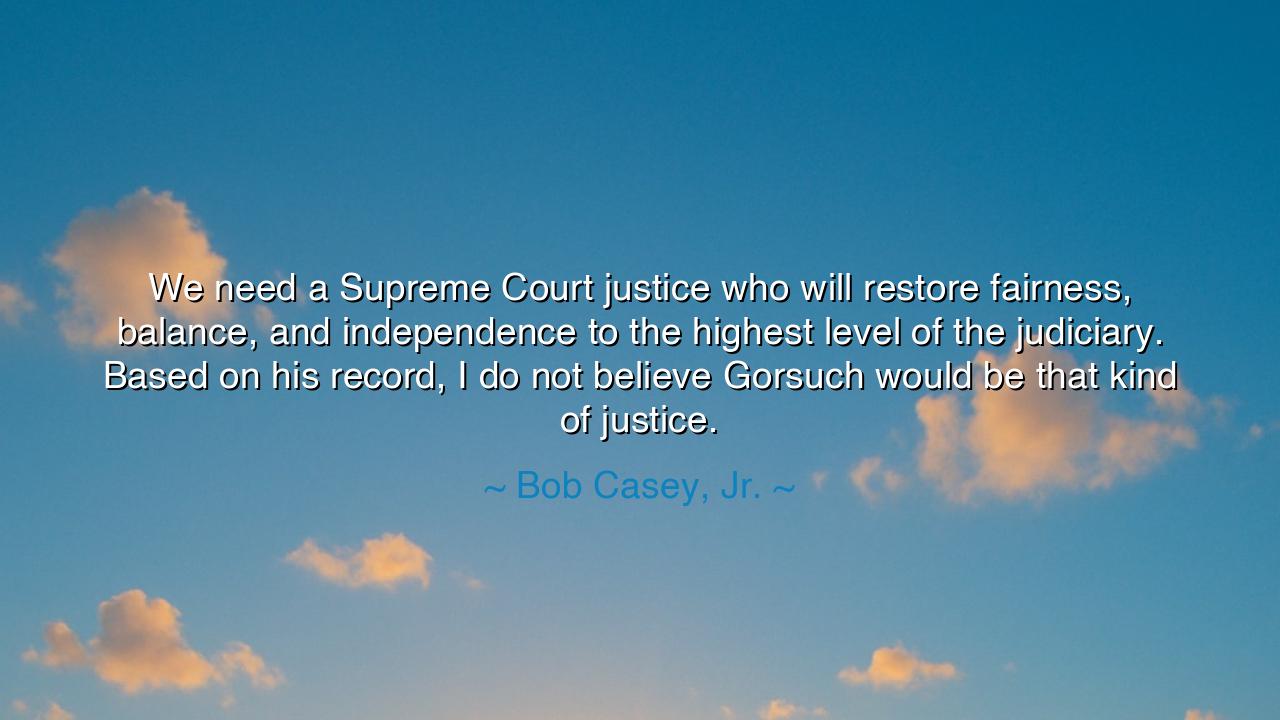
We need a Supreme Court justice who will restore fairness
We need a Supreme Court justice who will restore fairness, balance, and independence to the highest level of the judiciary. Based on his record, I do not believe Gorsuch would be that kind of justice.






The words of Bob Casey, Jr. speak not merely of one man or one court, but of the eternal struggle between power and principle, between justice and judgment. “We need a Supreme Court justice who will restore fairness, balance, and independence to the highest level of the judiciary. Based on his record, I do not believe Gorsuch would be that kind of justice.” Beneath these words lies a truth as old as civilization itself — that law, when divorced from conscience, becomes tyranny dressed in robes of reason. It is not the gavel that sanctifies justice, but the heart that wields it.
From the dawn of nations, societies have sought to place the scales of justice above the sword of might. In ancient Greece, the goddess Themis was carved in marble with eyes blindfolded — not to ignore truth, but to see all people equally. Yet time and again, men have lifted the blindfold to favor power over principle. It is this temptation, subtle and persistent, that haunts every judge, every ruler, every generation. Thus, when Casey calls for fairness, balance, and independence, he invokes not politics but the soul of democracy — the idea that no man, not even one robed in authority, stands above the moral law.
Consider the tale of Sir Thomas More, Chancellor of England, who stood before King Henry VIII and refused to betray his conscience for royal favor. “I die the King’s good servant,” he said, “but God’s first.” His execution was not merely the silencing of a man, but the warning of what occurs when justice bends to power. More’s legacy reminds us that independence within the judiciary is not a luxury — it is the final fortress between liberty and oppression. When that fortress crumbles, truth itself becomes negotiable.
Bob Casey’s words, though spoken in the realm of modern politics, are echoes of that same ancient wisdom. A Supreme Court justice is not chosen to please the powerful or echo the chorus of the majority. He or she is chosen to interpret law with courage and impartiality, to protect the weak from the strong, and to ensure that the light of fairness does not dim beneath the shadows of ideology. To question a judge’s fitness, therefore, is not an act of hostility — it is the sacred duty of a citizen guarding the sanctity of justice.
In every age, the fate of a nation depends not on its armies or wealth, but on its integrity — and the integrity of its courts reflects the moral pulse of its people. When the scales tilt toward one side, the balance of the world itself begins to tremble. Empires have fallen not because their laws were weak, but because their judges were compromised. Rome, too, once had its tribunals and oaths, yet when gold outweighed truth, the republic turned to ruin. The warning remains: a court without fairness is a country without a soul.
But there is also hope in Casey’s lament. For the very act of demanding fairness means that the spirit of justice still breathes among the people. The call for balance is the call of every citizen who refuses to let law become a weapon. It is a reminder that in a democracy, the voice of conscience must not be confined to marble halls — it must echo in the hearts of those who elect, question, and hold power accountable. Justice, after all, is not the work of nine, but of millions.
Therefore, let each listener take this as counsel for all ages: never surrender your right to demand fairness, balance, and independence from those who judge in your name. For when you are silent, injustice speaks. And when injustice speaks long enough, it begins to sound like truth. Support not those who promise convenience, but those who embody conscience. For only through such vigilance can the temple of law remain a sanctuary, not a stage for ambition.
In the end, the measure of a court — and of a nation — is not found in its verdicts, but in its virtue. A single just decision can redeem generations, and a single corrupt one can stain centuries. Let us, then, heed the wisdom in Casey’s words: guard your courts as you would your freedom, for they are one and the same. And remember — justice is not a voice from above, but a flame within. If we each keep it burning, no power on earth can extinguish it.






AAdministratorAdministrator
Welcome, honored guests. Please leave a comment, we will respond soon